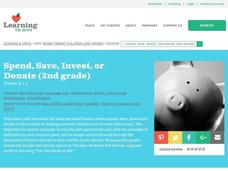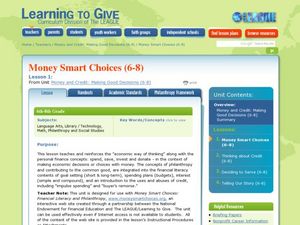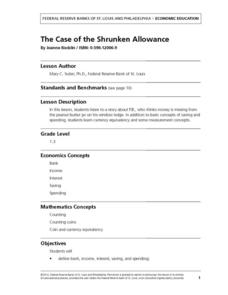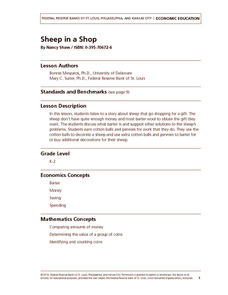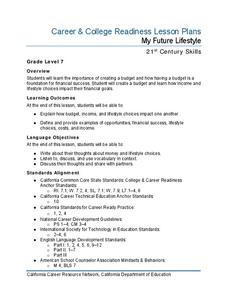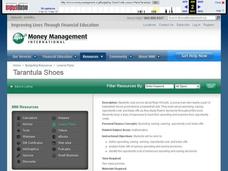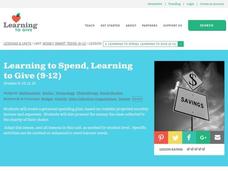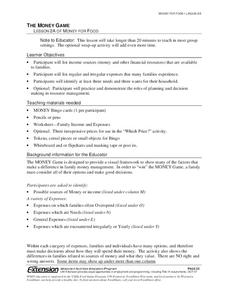Curated OER
Money Vocabulary
Explore the monetary system by completing worksheets in class. Learners will identify the monetary units of England and collaborate in groups to solve money word problems. They also identify several money-related vocabulary terms before...
Curated OER
Money Smart Teens
Students plan positive goals for spending resources and understand why not to spend. In this financial planning lesson, students set up personal spending plans based on their resources and their long term plans. Students plan for...
Curated OER
Consumer Borrowing and Spending
Credit can be confusing for teens, some of whom are already using credit cards. Clear up misconceptions with this group research activity which has a solid outline with a lot of room to adjust to your needs and resources. Groups are...
iCivics
Government Spending
After discussing personal financing with your class, consider following up with this well-rounded introduction to government spending. The resource includes reading documents and worksheets, and covers topics as the federal deficit and...
Curated OER
Money Smart children
Students elementary financial vocabulary words: spend, save, invest and donate. For this finance lesson, students respond to the story "Sam and the Lucky Moon." Students describe the concepts of wants and needs, resources, scarcity,...
Curated OER
Money and Credit: Making Good Decisions
Students participate in activities that teach them how to manage money. In this managing money lesson plan, students set long and short term goals for economic success by having discussions, identifying benefits of saving, and...
Curated OER
Meet Molly An American Girl
Learners examine concepts of personal finance. In this personal finance instructional activity, students use Valerie Tripp's, Meet Molly, An American Girl, to learn about saving and spending after World War II. They compare financial...
Curated OER
The Berenstain Bears Trouble with Money
Students will explore good and services, income and saving listening to the story The B. Bears Trouble With Money. In this early economic lesson, students discuss what it means to earn money doing services and save money to buy goods. ...
Curated OER
Savings Accounts and Interest
First graders study money, banks, and getting interest on money. In this consumer math lesson, 1st graders listen to Stan and Jan Berenstain's, Berenstain Bears' Trouble With Money. They use the concepts in the book to discuss...
Federal Reserve Bank
The Case of the Shrunken Allowance
An allowance is an important thing! Make sure your kids know how to save and spend their own money. Using the book The Case of the Shrunken Allowance as a starting point, this plan covers income, spending and saving, counting, and more.
Visa
A Plan for the Future: Making a Budget
From fixed and variable expenses to gross income and net pay, break down the key terms of budgeting with your young adults and help them develop their own plans for spending and saving.
Federal Reserve Bank
Sheep in a Shop
What do you think sheep might be able to barter when they don't have quite enough to buy a gift? Your pupils can find out this and much more during this lesson about Sheep in a Shop, spending, saving, and bartering.
California Department of Education
My Future Lifestyle
Mortgage, insurance, car payments...how much money will your learners need to support their desired lifestyle? Part three in a six-part college and career readiness lesson plan series tasks young job seekers with creating a monthly...
Curated OER
Tarantula Shoes
Students read a book about Ryan O'Keefe, a young man who wants a pair of basketball shoes promoted by a basketball star. They explore about spending, saving, opportunity cost, and trade-offs as they study Ryan's decisions throughout the...
Curated OER
Investing Money
Sixth graders participate in an simulated investment activity. They examine the purpose of different types of investments before they predict which will be the most successful. Finally, they simulate investing $1,000 in stocks, $1,000 in...
Curated OER
Making Money Work For You
Learners differentiate between saving and investing money. In this algebra lesson, students compare different investment options, recognizing the risks and rewards of investing and integrate investing into their financial planning.
Curated OER
Learning to Spend, Learning to Give
Students explore the concept of personal finances. In this personal finances lesson, students identify their income and expenses. Students create a budget for their spending, saving, investing, and donating habits. Students draw graphs...
Curated OER
Keeping Track of Our Money
Second graders complete activities to learn how to manage money. In this managing money lesson, 2nd graders read the book How the Second Grade Got $8,205.50 to Visit the Statue of Liberty and complete two related worksheets.
Curated OER
Money Management
Students role play buying and selling items. In this economics lesson, students are given play money with which to purchase items, as well as value their own items for others to buy. Each student in the group works together to decide...
Learning to Give
Five Thousand Dollars!
How does consumerism affect global poverty? Upper graders find out about cost benefit, wants and needs, and making good consumer choices as they explore this global topic. They role-play an impulse spending experience and work through...
Curated OER
Money, Money, Honey Bunny!
Young scholars determine the differences between goods and services, and saving and spending. In this economics lesson, students listen to a rhyming story about a bunny with money. They play a matching game with the associated cards and...
Curated OER
The Money Game
Eleventh graders investigate the amount of money that families use throughout the year. In this economic and math lesson, 11th graders participate in a money bingo game. Students analyze the needs and wants for a household.
Curated OER
Labor, Choice, and Sales Tax
Students consider the idea of earning and spending money. In this money management lesson plan, students discuss the concept of saving and spending money through the reading of a story and by completing several activities that involve...
Visa
Money Matters: Why It Pays to Be Financially Responsible
What does it mean to be financially responsible? Pupils begin to develop the building blocks of strong financial decision making by reviewing how their past purchases are examples of cost comparing, cost-benefit analysis, and budgeting.






